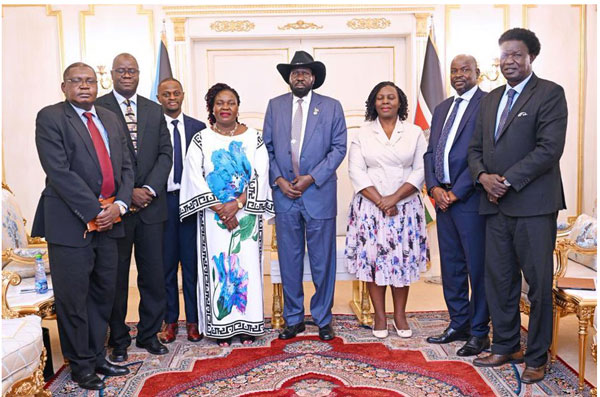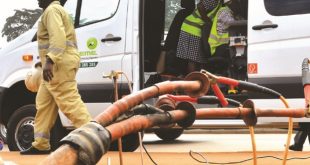
Juba, South Sudan | THE INDEPENDENT | Uganda and South Sudan have signed a Power Sales Agreement (PSA) for trade in electricity between the two countries.
Trading of electricity across the border is expected to benefit the towns of Oraba and Elegu in Uganda, and Kaya and Nimule in South Sudan.
The signing of the sales agreements comes at a time when Uganda is about to switch on the 600MW Karuma power station that has been under construction since 2013.
Uganda and South Sudan signed a Memorandum of Understanding between in December 2015 setting negotiations. The memorandum was signed by then-state Minister for Energy Simon D’ujang.
A statement from the Ministry of Energy said the power purchase agreement was signed in the South Sudanese capital Juba on Tuesday.
The Minister of Energy, Ruth Nankabirwa Ssentamu led the Ugandan delegation accompanied by the ministry’s Permanent Secretary, Irene Bateebe. Peter Marcello Jelenge, represented the South Sudan government.
The 400kV Olwiyo-Juba Transmission Line will pick up power from Olwiyo Substation, which is already operational at 132 kV.
The agreement will see the development of the 400kV Olwiyo – Juba Power Transmission line of 308km. Uganda will develop 138km of the line on the Ugandan side while South Sudan will construct 170km on its side. The deal will see the expansion of the 400kV Power Substations of Olwiyo and Bibia near Uganda’s Elegu border post while the Juba Substation will also be expanded.
The Ministry of Energy Permanent Secretary, Irene Bateebe, signed the power purchase agreement on Uganda’s behalf, while Beck Awan Deng, the General Manager of South Sudan Electricity Cooperation (SSEC), signed on behalf of his country.
“Today’s signatures mark the beginning of serious cooperation in power trade between Uganda and South Sudan,” said Dr Nankabirwa.
“We would like to see projects that benefit both the people of Uganda and South Sudan…We will take power from small towns in Uganda, such as Elegu and Oraba. Similarly, the people at the border of such as Nimule and Kaya in South Sudan shall be supplied with power from Uganda,” said Nankabirwa.
Nankabirwa did not however reveal other detail concerning the financing of the project and how much Uganda was selling the power and vice versa.
Meanwhile, a Joint Technical Committee has been established to plan and coordinate the project’s development.
Uganda and South Sudan have secured funds for feasibility studies from African Development Bank (AfDB). AfDB would also finance the project based on EPC or Public Private Partnership, depending on the outcome of the feasibility study.
A consortium of CESI S.p.A (Italy), ELC Electroconsult S.p.A. (Italy) and Colenco Consulting Ltd (Nigeria) has been procured to undertake the feasibility study, which commenced in March 2023 and will be completed in February 2024. The two countries also collaborate in the power distribution segment, where distribution networks have already been constructed in the Uganda-South Sudan border towns of Nimule and Kaya.
Another PSA was executed between Uganda Electricity Transmission Company Limited (UETCL) and Juba Electricity Distribution Company Limited (JEDCO) to ensure seamless Nimule and Kaya power distribution.
The Power Purchase Agreement between Uganda and South Sudan is within the spirit of Nile Cooperation under the Nile Basin Initiative’s Nile Equatorial Lakes Subsidiary Action Program (NELSAP)
The Nile Equatorial Lakes Subsidiary Action Program (NELSAP) is one of two investment programs under the Nile Basin Initiative (NBI).
The Nile Basin Initiative (NBI) is a partnership of the riparian states effective 1999; it seeks to develop the river in a cooperative manner, share substantial socioeconomic benefits, and promote regional peace and security through its shared vision of “sustainable socioeconomic development through the equitable utilization of, and benefit from, the common Nile Basin water resources”.
The NBI is based in Entebbe, Uganda; it includes Burundi, the Democratic Republic of Congo, Egypt, Ethiopia, Kenya, Rwanda, Sudan, Tanzania, and Uganda. Eritrea is participating actively in the NBI as an observer.
****
URN
 The Independent Uganda: You get the Truth we Pay the Price
The Independent Uganda: You get the Truth we Pay the Price




What countries are involved in the electricity export deal mentioned in the article?
Best of luck to them, Nankabirwa and Salva Kiir
nice information
nice infomation